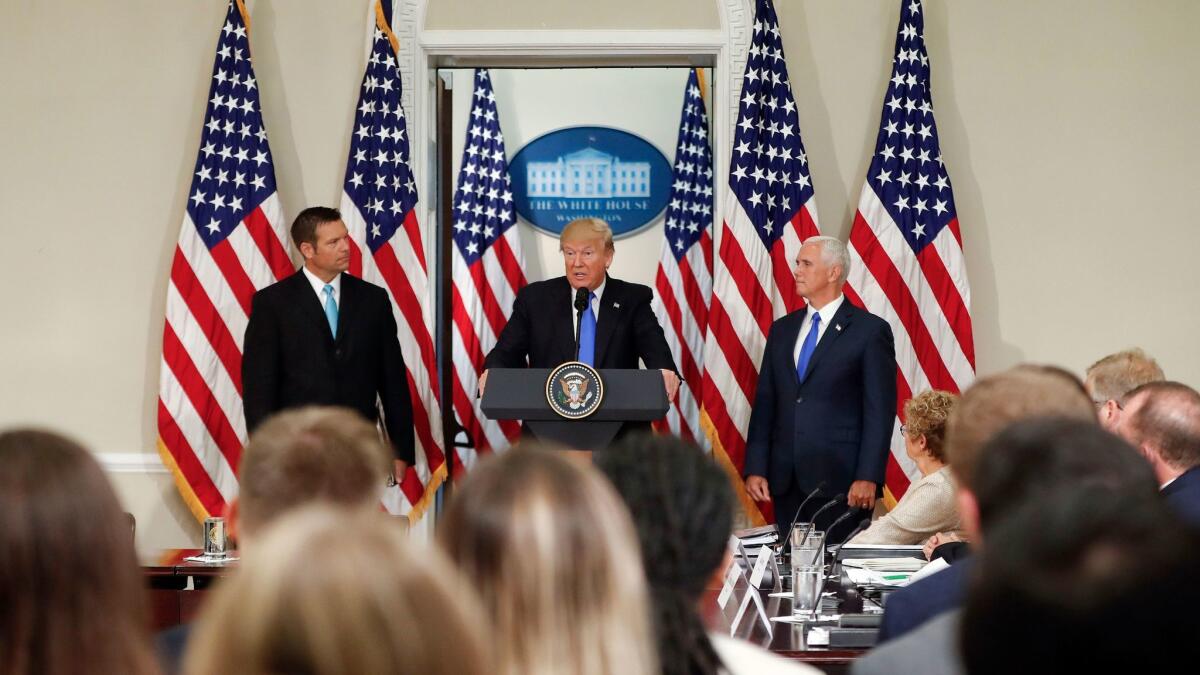Editorial: Goodbye and good riddance to Trump’s fraudulent voter fraud commission

- Share via
Good riddance to the failed Presidential Advisory Commission on Election Integrity. President Trump disbanded the panel late Wednesday, less than eight months after bringing it to life and with little to show for its efforts other than a spate of lawsuits. The dissolution was an appropriately ignoble ending to a partisan commission that was built on a faulty premise and bungled just about everything it did.
But Trump still seems unwilling to let go of his baseless belief that millions of ballots were illegally cast for his opponent in the 2016 presidential election by noncitizens and other ineligible voters. He won the Electoral College but lost the popular vote to Hillary Clinton by about 3 million. And the results evidently still sting. In the statement Wednesday announcing the end of the commission, the White House said it was taking the action in spite of “substantial evidence of widespread fraud.”
Trump blames the commission’s demise on its inability to gather the information it needed from California and other states, which refused to turn over sensitive voter data, and the mounting cost of the lawsuits filed against the commission. But those were merely the predictable results of an endeavor that was flawed from the start. The real fault lies with the president himself.
Things went downhill for the commission from the start.
Trump’s first mistake was to convene a panel not to explore problems in the voting process, but to go get him proof of the massive election fraud he concocted to explain why he didn’t beat Clinton in the popular vote. There are worrisome threats to the integrity of the nation’s election system worthy of a truly independent, nonpartisan commission’s time: antiquated voting equipment, low turnout, the potential for hacking and meddling by foreign governments, to name the top few. But if voter fraud is on the list, it would be at the bottom and well after vote suppression, because research has consistently found only infrequent cases of actual fraud in the casting of ballots.
His second mistake was the choice of leadership. Vice President Mike Pence was the titular chair, but Republican Kansas Secretary of State Kris Kobach, as vice chairman, oversaw the day-to-day operations of the panel. Kobach is dedicated to the counterfactual notions that voting fraud is rampant and that the only solution is to make it harder for people to register and vote. He supports requiring proof of citizenship at the polls, and, as a pair of court rulings last year indicate, he doesn’t seem to have any qualms about using questionable tactics to accomplish his goals.
Things went downhill for the commission from the start. There were five Democrats invited to serve on the 12-member panel, but they seem to have been on the outside looking in. One of the pesky lawsuits that Trump noted in his announcement was filed by a Democratic member of the commission, Maine Secretary of State Matthew Dunlap, who claimed he was denied even basic information about the commission’s activities. He also said the idea that the commission was bipartisan was a “facade.”
In his first major act, Kobach sent a letter to elections officials in every state requesting personal information about voters, including Social Security numbers, dates of birth and felony convictions, with no explanation of how the data would be used or protected. Most states, including those with Republican leadership, denied the request, in many cases because doing so would violate state law.
In September Kobach wrote an op-ed for the Breitbart News site claiming New Hampshire Democratic Sen. Maggie Hassan won her seat in 2016 because of ballots illegally cast by voters from outside the state. (That claim was later debunked and the out-of-state voters shown to be most likely students who were entitled to vote while attending college in New Hampshire.)
We could go on about the panel’s lack of transparency and the federal lawsuits filed to stop the collection of data. Suffice to say, any report the commission might have produced would have been seriously undermined by the commission’s missteps.
We’d hope that after almost a year in the White House, Trump could let go of his fantasy about hordes of illegal voters and not waste any more of the government’s resources chasing the fraud fairy. But that doesn’t seem to be the case. Trump has asked the Department of Homeland Security to review the commission’s work so far and decide how to proceed. Here’s our suggestion: Toss the commission’s findings in the circular file and put this debacle to rest for good.
Follow the Opinion section on Twitter @latimesopinion and Facebook
More to Read
A cure for the common opinion
Get thought-provoking perspectives with our weekly newsletter.
You may occasionally receive promotional content from the Los Angeles Times.









